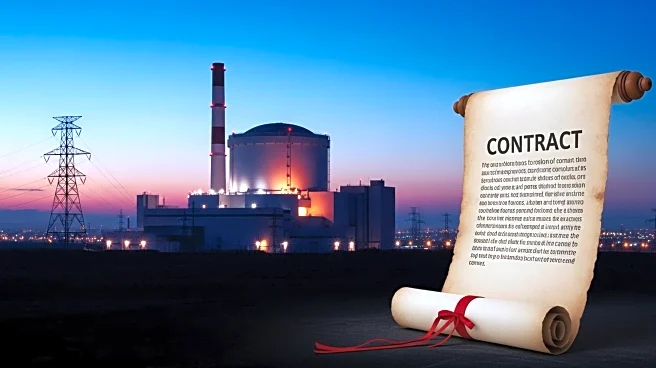What is the story about?
What's Happening?
Iranian officials have signed a $25 billion agreement with Rosatom, Russia's state-owned nuclear power company, to construct at least four nuclear power plants in Iran. The deal was announced on September 26, shortly before anticipated United Nations sanctions on Iran's nuclear program. The agreement includes the construction of small nuclear power plants, although the exact number of reactors was not disclosed. This development follows European countries' decision to trigger 'snapback sanctions' due to Iran's non-compliance with the 2015 nuclear agreement. Iran aims to generate 20 GW of electricity from nuclear power by 2040, with plans for eight reactors in collaboration with Russia.
Why It's Important?
The deal between Iran and Rosatom is significant as it represents a major expansion of Iran's nuclear capabilities amidst international tensions over its nuclear program. The agreement could potentially alter geopolitical dynamics, especially in the Middle East, where nuclear proliferation is a sensitive issue. The involvement of Russia, a key player in global nuclear technology, underscores the strategic alliances forming in response to Western sanctions. This development may impact global energy markets and international relations, particularly concerning nuclear non-proliferation efforts.
What's Next?
The construction timeline for the new nuclear plants has not been specified, but ongoing projects at Bushehr are expected to be completed soon. The international community, particularly Western nations, may respond with increased diplomatic pressure or further sanctions. Iran's nuclear ambitions could lead to heightened scrutiny and negotiations, especially with the looming threat of additional sanctions. The situation may also influence regional security policies and alliances.
Beyond the Headlines
The agreement highlights the complex interplay between energy needs and geopolitical strategies. Iran's pursuit of nuclear energy is partly driven by its goal to diversify energy sources and reduce reliance on fossil fuels. However, the environmental and safety implications of expanding nuclear power in a region prone to political instability are significant. The deal also raises questions about the effectiveness of international sanctions and the role of major powers like Russia in shaping global nuclear policy.














